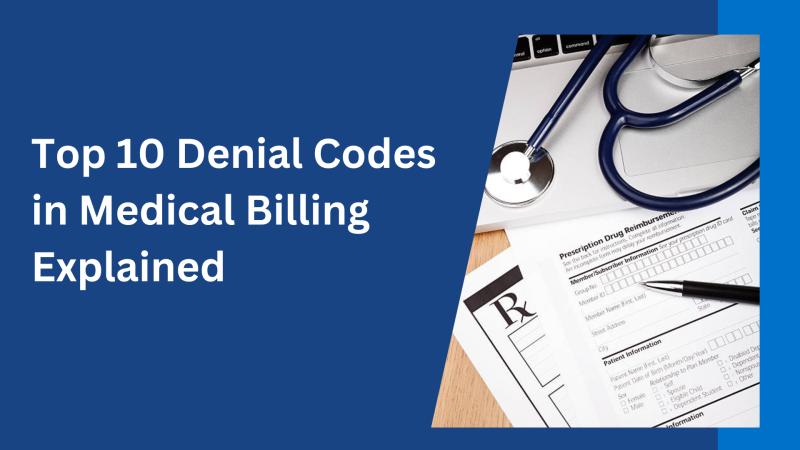Top 10 Denial Codes in Medical Billing Explained

For medical billing services for small practices, understanding denial codes is crucial to maintaining steady cash flow. Denial codes provide specific reasons why a claim was rejected, helping billing professionals identify issues and take corrective action. By managing these denials effectively, practices can reduce revenue losses, streamline operations, and avoid common billing errors that delay reimbursement.
CO-11: Diagnosis Inconsistent with Procedure
The CO-11 denial code signifies that the diagnosis provided on the claim does not align with the treatment or procedure code submitted. This code often occurs when the diagnostic code does not adequately support the need for the procedure performed. Billing professionals can reduce this denial by ensuring that the selected diagnosis codes match the services rendered, thereby aligning with insurance payer requirements.
CO-16: Missing Information
CO-16 is a commonly encountered denial code indicating that the claim lacks essential information needed for processing. Missing information can include anything from patient demographic details to service-specific data. Verifying all required fields before claim submission is essential to avoid these denials. Automated claim scrubbing tools can help ensure claims are complete and minimize instances of missing information.
CO-18: Duplicate Claim or Service
The CO-18 code appears when a duplicate claim has been submitted. Duplicate claims can lead to denials if a similar service for the same patient and date was previously processed. To prevent duplicate claim denials, practices should implement checks in their billing system to detect any repeated claims and avoid unnecessary re-submissions that result in CO-18 denials.
CO-22: Beneficiary Not Covered
CO-22 denotes that the patient did not have active insurance coverage on the date of service. This denial often stems from outdated insurance information or eligibility issues. To avoid CO-22 denials, it's essential to verify patient eligibility and benefits before each visit. Staying updated on coverage changes helps ensure that claims align with the patient’s active insurance plan, reducing the risk of denials.
CO-29: Late Filing
A CO-29 denial indicates that the claim was submitted after the payer’s designated filing deadline. Each payer has unique guidelines on timely filing, and missing these deadlines results in denials that cannot be appealed. Establishing a regular claim submission routine and tracking deadlines carefully can help practices avoid CO-29 denials and ensure prompt claim processing for all services rendered.
CO-50: Non-Covered Services
The CO-50 denial code occurs when the service rendered is not covered under the patient’s insurance policy. This may happen when the procedure does not align with the patient’s specific policy or insurance type. Billing teams should verify the patient’s policy details before performing the service, ensuring that the procedure is covered. Patient education on potential out-of-pocket costs can also help prevent misunderstandings.
CO-109: Claim Not Covered by Payer/Contracted Provider
The CO-109 denial code appears when the payer does not cover services provided by an out-of-network provider. This denial highlights the importance of verifying provider network participation for the patient’s insurance plan. Practices can reduce CO-109 denials by ensuring that providers are enrolled with major payers or, if not, by informing patients about potential costs for out-of-network services.
CO-140: Patient/Insured Health Identification Number Missing/Invalid
CO-140 indicates an issue with the patient’s identification number. This error often occurs when data entry mistakes are made or when using outdated insurance information. Checking the ID number for accuracy before submitting the claim can help prevent this type of denial. Proper patient data verification at the intake stage ensures the correct identification number is used, reducing the likelihood of rejections.
CO-197: Precertification/Authorization Required
The CO-197 denial code applies when prior authorization is needed but has not been obtained for the procedure. Some insurers require pre-authorization for specific services or treatments, and neglecting this step results in denials. Billing teams can address CO-197 denials by confirming authorization requirements during appointment scheduling and acquiring the necessary approvals before providing services.
CO-204: Service/Emergency Not Covered by Plan
The CO-204 code typically arises when a procedure or emergency service is not covered under the patient’s health plan. This may be due to the plan type, limitations in coverage, or restrictions specific to emergency services. To avoid CO-204 denials, practices should review the patient’s plan specifics and communicate any limitations. Alternative payment arrangements or financial counseling may also assist patients in understanding their coverage.
Conclusion
Understanding these top 10 denial codes in medical billing can improve claim accuracy and reduce payment delays. Effective denial management strategies such as verifying patient details, securing authorizations, and using automated systems can streamline operations and enhance revenue flow. RevenueEs, a trusted medical billing company for small practices, specializes in helping practices navigate and resolve denial codes, ensuring a smoother revenue cycle and financial stability.
Post Your Ad Here
Comments